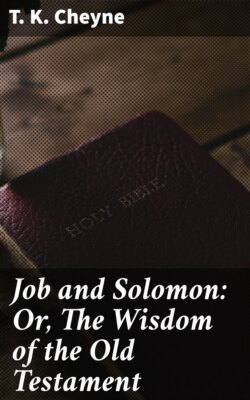Читать книгу Job and Solomon: Or, The Wisdom of the Old Testament - T. K. Cheyne - Страница 16
На сайте Литреса книга снята с продажи.
2.
The Autobiographical Element in its Bearing on the Purpose of the Poem.
ОглавлениеA German critic (Dillmann), in speaking of Job, has well reminded us that ‘the idea of a work of art must reveal itself in the development of the piece: it is not to be condensed into a dry formula.’ Least of all, surely, is such formulation possible when the work of art is an idealised portraiture of the author himself, and such, I think, to a considerable extent is the Book of Job. Those words of a psalmist,
Come and hear, all ye that fear God,
and I will declare what he hath done for my soul
(Ps. lxvi. 16, R. V.)
might be taken as the motto of Job. In short, the author is thoroughly ‘subjective,’ like all the great Hebrew and especially the Arabian poets. ‘In the rhythmic swell of Job’s passionate complaints, there is an echo of the heart-beats of a great poet and a great sufferer. The cry “Perish the day in which I was born” (iii. 3) is a true expression of the first effects of some unrecorded sorrow. In the life-like description beginning “Oh that I were as in months of old” (xxix. 2), the writer is thinking probably of his own happier days, before misfortune overtook him. Like Job (xxix. 7, 21-25) he had sat in the “broad place” by the gate and solved the doubts of perplexed clients. Like Job, he had maintained his position triumphantly against other wise men. He had a fellow-feeling with Job in the distressful passage through doubt to faith. Like Job (xxi. 16) he had resisted the suggestion of practical atheism, and with the confession of his error (xlii. 2-6) had recovered spiritual peace.’
The man who speaks to us under the mask of Job is not indeed a perfect character; but he does not pretend to be so. How pathetic are his appeals to his friends to remember the weight of his calamity—‘therefore have my words been wild’ (vi. 3)—and not to ‘be captious about words when the speeches of the desperate are but for the wind’ (vi. 26). He was no Stoic, and had not practised himself in deadening his sensibility to pain. Strong in his sense of justice, he lacked those higher intuitions which could alone soothe his irritation. But he was throughout loyal to the God whom his conscience revered, and, even in the midst of his wild words, he let God mould him. First of all, he renounced the hope of being understood by men; he ceased to complain of his rather ignorant than unfeeling friends. He exemplified that Arabic proverb which says, ‘Perfect patience allows no complaint to be heard against (human creatures).’ Then he came by degrees to trust God. There is a kernel of truth in that passage of the Jerusalem Talmud (Berakhoth, cix. 5) where, among the seven types of Pharisees, the sixth is described as ‘he who is pious from fear, like Job,’ and the seventh, as ‘he who is pious from love, like Abraham.’ Job’s religion was at first not entirely but still too much marked by fear; it ended by becoming a religion of trust, justifying the title borne by Job among the Syrians, as if in contradiction to the Talmud, of ‘the lover of the Lord.’[82]
So far as the author of Job has any direct purpose beyond that of giving a helpful picture of his own troubles, it is no doubt principally a polemical one. He has suffered so deeply from the inveterate error (once indeed a relative truth) so tenaciously maintained by the wisest men that he would fain crush the source of so much heart-breaking misery. But that for which we love the book is its φιλανθρωπία, its brotherly love to all mankind. No doubt the author thinks first of Israel, then (as I suppose) suffering exile; but the care with which the poem is divested of Israelitish peculiarities, seems to show that he looks beyond his own people, just as in his view of God he has broken the bonds of a narrow ‘particularism.’ ‘I can see no other explanation of those apparently hyperbolical complaints, that strange invasion of self-consciousness, and that no less strange ‘enthusiasm of humanity’[83] ... than the view expressed or implied by Chateaubriand, that Job is a ‘type of righteous men in affliction—not merely in the land of Uz, nor among the Jews in Babylonia, nor yet, on Warburton’s theory of the poem, in the Judæa of the time of Nehemiah, but wherever on the wide earth tears are shed and hearts are broken.’ This is the truth in the too often exaggerated allegorical view[84] of the poem of Job. According to his wont, the author lets us read his meaning by occasional bold inconsistencies. No individual can use such phraseology as we find in xvii. 1, xviii. 2, 3, xix. 11, and perhaps I may add xvi. 10, xxvii. 11, 12. And yet the fact that Job often speaks as the ‘type of suffering humanity’ no more destroys his claim to be an individual ‘than the typical character of Dante in his pilgrimage and of Faust in Goethe’s great poem annuls the historical element in those two great poetical figures.’[85]
